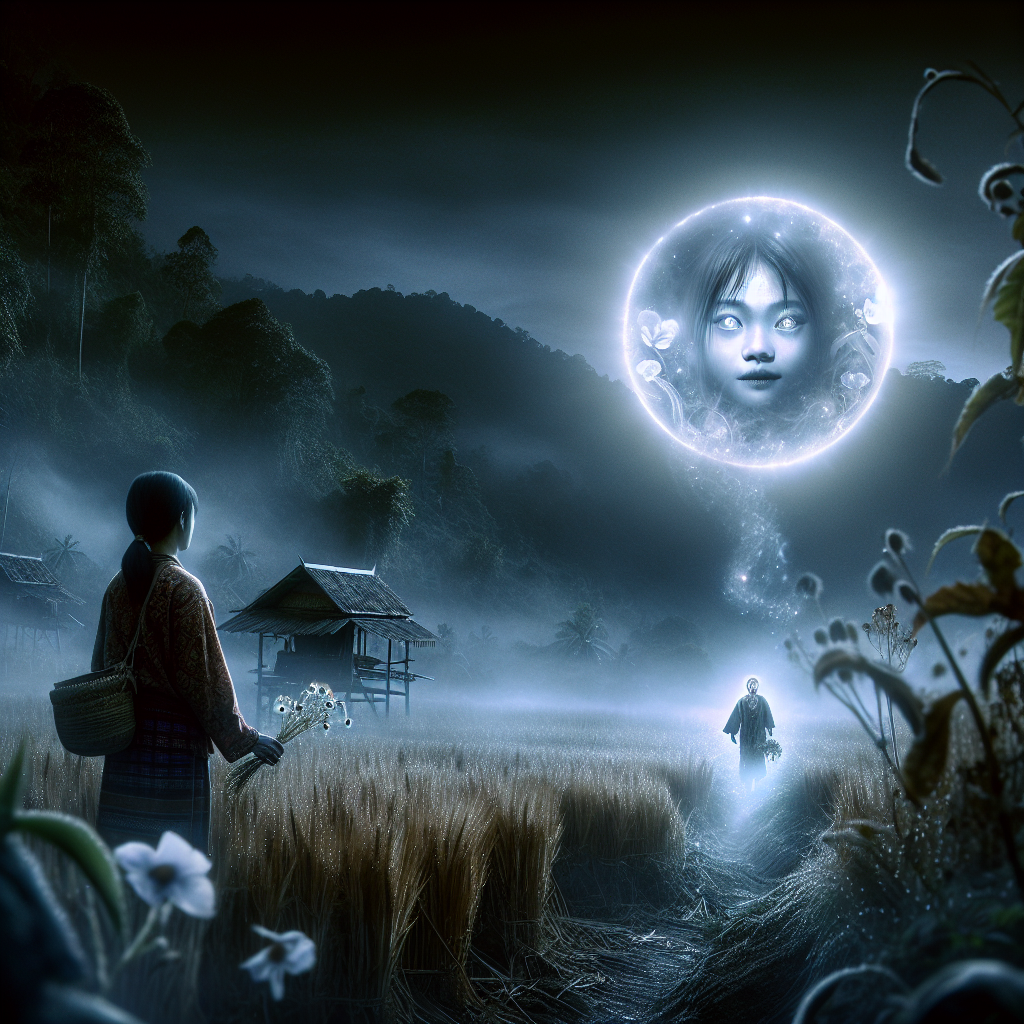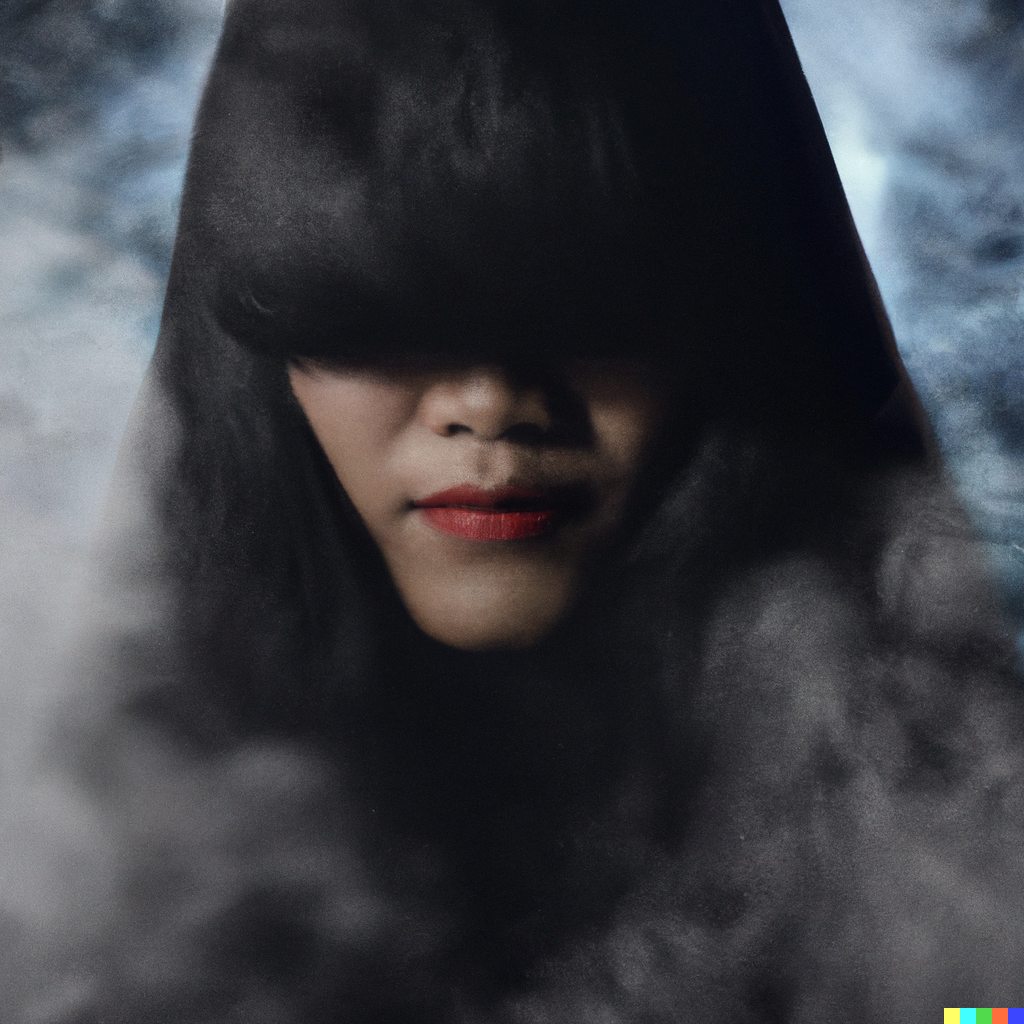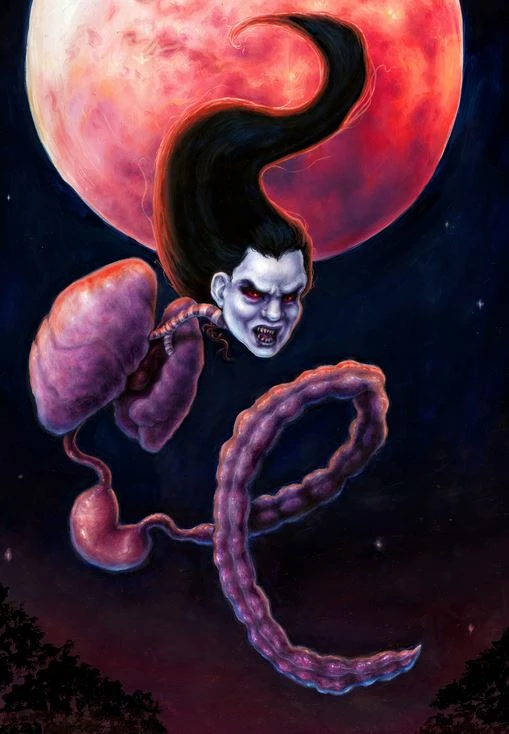The Haunting Legend of Krasue: A Tale of Terror and Beauty
In the depths of rural Northern Thailand, where moonlight kisses the dew-drenched fields and shadows stretch hauntingly across the land, there exists an unsettling legend known as the Krasue. This spirit, as enchanting as she is terrifying, is depicted as a beautiful young woman disembodied from her own body—her head floats eerily against the backdrop of the night’s curtain, trailing behind her a grotesque ensemble of internal organs, which cling from her severed neck like tainted ribbons. It’s said that those who tread the darkness unwarily might just encounter her, guided by a sinister hunger—as horrifying tales unfold around her. “A wandering head: nourished by the burdens of the forsaken.”
Long ago, it is believed that Krasue was once a mortal woman corrupted by the wrong choices in life: drawn to black magic and deceit which damned her soul. The night she chose to forsake her humanity was the night she transformed into a malevolent force, wandering the dim-lit fields not as a person but as a shadow. With each unsuspecting villager she encounters, her thirst for flesh and strife continues to grow, invoking fear among the small farming communities who embrace these harrowing tales as their truth.
One fateful evening, Aranya, a curious young villager, found herself drawn out beyond her home on the stroke of midnight. An owl hooted ominously—a prelude of horrors yet to unveil. As she plucked wildflowers by a dimly lit path, an unsettling chill broke through the warmth of her breath. Moments later, she caught a flicker—a gruesome apparition. The breath caught in her throat. There, beyond the shadows, floated Krasue, her haunting visage mesmerizing yet revolting. The piercing howl of loneliness echoed as Aranya stared helplessly, her heart beating like thunder against the drum of her chest. It felt easier to breathe until the heavy weight of primal fear forced dormant instincts alive.
With a livid scream, Krasue lurched forward, mouth stretching into an unspeakable grimace, eager for nourishment. Aranya’s mind raced, adrenaline surged through her veins, and with a final glance at the predatory beauty, she turned to run. The clanking sound of her heart was a grim beacon, but darkness wove corruption among fertile farms, and the edges of the grass seemed to mercilessly reach for her. Willing her legs to bend and flee, terror screamed inside her as she sprinted home, eyes darting for shadows and the perils lurking just out of sight.
In a dash fueled by fear, she burst through the door, slamming it with a bone-jarring finality. Breath heavy, tears welling, she sought refuge in her pounding heart’s rhythm. Still, there was an exhausting reality from which she couldn’t escape—the disembodied cries lingered in her ears. The sight of Krasue was etched in her memory: haunting beauty entwined with grotesque horror made real. Days melted into restless nights filled with paranoia as shadows flickered dangerously in unlit forms.
Eventually, communities rallied together, banding to scatter warnings, folklore merging with compassion, finally rediscovering strength in unity. Exorcists came, chants filled the air as they took precaution to shield their homesteads from the blood-hungry night-walker seeking to mend ancient ruptures drawn on split destinies. Using rituals, the townsfolk called forth benevolent spirits of the past—invoking them as counterforces, releasing the dismal fog brewed by Krasue’s moral transgressions. Their rousing choreography, enriching connection to their roots, seemed to capture the malignant energy that roamed the scenery.
As the moon wavered to a gentle half-light, whispers of victory became tangible. Though Krasue remains an enduring legend, her inflictions—which gripped night wanderers—subside only slightly, lurking like seasonal sorrow throughout the countryside today. With dedicated watch, villagers assure that the haunting shout of the wind does not hold justice for those cursed but instead remind of choices: grace or shadow.
Modern-day Aranya leads these stories gathered in hushed voices and winking laughter—far more wise than eager as dusk settles. To this day, she warns children to refrain from dawdling until the crow of the wary cock mocks the moon shadows—the witches and spectres would rather they tread back home untouched in this seamless interplay of beauty and horror—but watchful rescue will not guarantee their peace in her lonely past, bookended by cries of despair and loss. To grow even more persuasive tales of caution; the warning contains a resonance since her unveiling night. What purchases hope for an hour dissolved carries enough eternal stakes, ensuring the piercing glow inhabits heads still afloat—unoccupied fragility whispering of danger.






